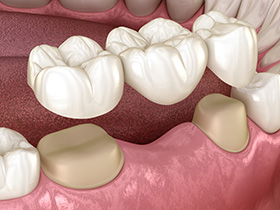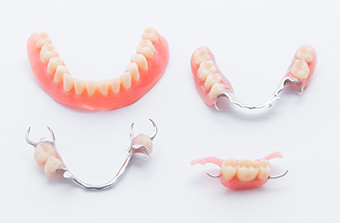Book an Appointment
(02) 93 000 999
There are many options available to replace missing tooth/teeth, such as dental implants, dental bridge, dentures or direct composite bridge. These options vary significantly in cost, length of treatment and the functional and aesthetic outcomes.
A lot of people are confused about which option is the best for them. At Dentist Mandy, we will discuss options available to your individual circumstances and help you to make the most suitable decision.
In this article, we will explore the options of dental bridges and dentures.
A dental bridge replaces your missing teeth with false teeth and is an alternative to dentures. Rather than being removable like dentures, a dental bridge is affixed to your natural teeth either side of the gap left by your missing teeth as a permanent solution. Generally crafted from porcelain, they can also be made of metal or a mixture of both.
Unlike dental implants, dental bridges don’t require surgery and the treatment can be completed as little as 2 appointments (depending on the level of treatment you require). It is a good alternative to dentures, when you don’t need a removable option, but you also do not want dental implants at the same time.

There are many different types of dental bridges such as traditional, cantilever, maryland and implant-supported. The type of dental bridge you may require will be based on your unique structure, how many teeth need to be replaced and your lifestyle. We welcome you to join us in our Bondi dental clinic to discuss which options might be right for you.
Dental bridges literally bridge the gap created by one or more missing teeth. A bridge is made up of two or more crowns for the teeth on either side of this gap as well as the “false” teeth which replace your missing natural teeth.
The steps required to make a dental bridge is very similar to making dental crowns. You can find out more about it here.
Under most circumstances, the answer is ‘no’. A bridge becomes loose for a reason, most likely due to the failure of the natural teeth on either side of the false tooth. Therefore, the damaged teeth need to be repaired before a new bridge can be made.
Re-gluing a loose dental bridge can risk further damage to the adjacent natural teeth.

Dentures are prosthetic replacements for missing teeth. Dentures are not fixed to your jaw or teeth, they are removable.
There are few types of denture and denture materials available in the market. The type we recommend will be based on the number of missing teeth you have, how many teeth need to be replaced and the overall structure of your mouth.
Dentures can be a good option to replace missing teeth if you do not want to go through oral surgery (in the case of implants), or if the remaining teeth are not suitable for bridge preparation. A thorough assessment and discussion are required to determine whether dentures are a suitable treatment for you.
It takes at least 4 to 6 weeks from start to finish to make a partial denture. We need to make molds of your existing teeth and its relationship to your jaw, try the denture framework, choose the right shade of artificial teeth and then give you the denture to try for a couple of weeks before any adjustments.
You should remove and gently clean your dentures at least once a day, preferably after each meal. Use a soft-bristled brush (without toothpaste or anything that has abrasive ingredients) to brush with just plain warm water.
Dentures can warp or distort if they dry out, so it’s important to keep them moist and in a secure spot. We recommend that you soak your dentures in water (perhaps with denture cleaning tablets) at night time.

